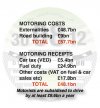Hi forum members and anonymous readers (like myself until very recently),
This is not a purely railway thread, it's rather about the train vs car policies, so I am ok if it's moved to another sub-forum.
I moved relatively recently to the UK after having lived for some time in France, and there are some differences in their transport systems that surprise me.
It looks like it is often cheaper to travel by car even between major British cities, than taking a train even on advance tickets. The difference is even more striking if there are multiple passengers in a car. For example, London - Manchester can cost around £20 for fuel for the whole car, while train prices usually start from around £35 per person. While driving results in a longer journey, it has an added convenience of being able to choose when to drive, not needing to change from a train to a tube/bus with luggage etc, which makes it a no-brainer for many people who already own cars.
Let's compare this to, for example, Paris - Lyon. It is often possible to find train tickets for 16€, while driving will cost around 35€ for fuel and another 35€ for tolls. Given that a train takes around 2 hours, in contrast to 5 hours, here taking a train becomes almost a no-brainer, the very opposite to the situation in the UK.
I understand that much of it is because the public transport in the UK is less subsidized than in France. But it looks like it is completely fine to effectively subsidize the motorways, which is a bit strange to me. Yes, the car owners are paying the vehicle tax, but it doesn't depend on how much they drive and whether they use motorways or not.
In my opinion, this situation has several negative consequences:
1. People who own cars are incentivized to use them for long journeys even when there are alternatives by train, contributing to pollution, congestion, accidents etc.
2. People who don't own cars for economic reasons are limited in terms of mobility across the country.
And here are several questions that I would love to discuss with the forum:
- Why are the situation so different?
- Should the UK move towards the French model to make using trains (and public transport in general) cheaper than using a car?
- Would you agree to pay for using motorways to subsidize public transport?
- Have there been any plans to fix this problems that were given attention at the government level?
- Do you think that HS2 will help by providing extra capacity and allowing to reduce the train fares?
I am very interested in what you think about this!
Cheers,
Dima
This is not a purely railway thread, it's rather about the train vs car policies, so I am ok if it's moved to another sub-forum.
I moved relatively recently to the UK after having lived for some time in France, and there are some differences in their transport systems that surprise me.
It looks like it is often cheaper to travel by car even between major British cities, than taking a train even on advance tickets. The difference is even more striking if there are multiple passengers in a car. For example, London - Manchester can cost around £20 for fuel for the whole car, while train prices usually start from around £35 per person. While driving results in a longer journey, it has an added convenience of being able to choose when to drive, not needing to change from a train to a tube/bus with luggage etc, which makes it a no-brainer for many people who already own cars.
Let's compare this to, for example, Paris - Lyon. It is often possible to find train tickets for 16€, while driving will cost around 35€ for fuel and another 35€ for tolls. Given that a train takes around 2 hours, in contrast to 5 hours, here taking a train becomes almost a no-brainer, the very opposite to the situation in the UK.
I understand that much of it is because the public transport in the UK is less subsidized than in France. But it looks like it is completely fine to effectively subsidize the motorways, which is a bit strange to me. Yes, the car owners are paying the vehicle tax, but it doesn't depend on how much they drive and whether they use motorways or not.
In my opinion, this situation has several negative consequences:
1. People who own cars are incentivized to use them for long journeys even when there are alternatives by train, contributing to pollution, congestion, accidents etc.
2. People who don't own cars for economic reasons are limited in terms of mobility across the country.
And here are several questions that I would love to discuss with the forum:
- Why are the situation so different?
- Should the UK move towards the French model to make using trains (and public transport in general) cheaper than using a car?
- Would you agree to pay for using motorways to subsidize public transport?
- Have there been any plans to fix this problems that were given attention at the government level?
- Do you think that HS2 will help by providing extra capacity and allowing to reduce the train fares?
I am very interested in what you think about this!
Cheers,
Dima

